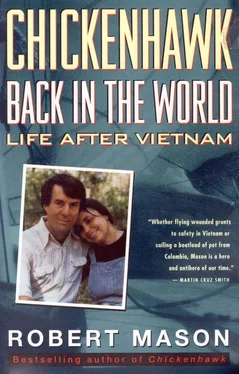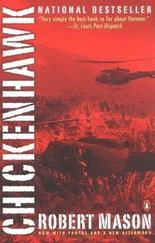Robert Mason - Chickenhawk - Back in the World - Life After Vietnam
Здесь есть возможность читать онлайн «Robert Mason - Chickenhawk - Back in the World - Life After Vietnam» весь текст электронной книги совершенно бесплатно (целиком полную версию без сокращений). В некоторых случаях можно слушать аудио, скачать через торрент в формате fb2 и присутствует краткое содержание. Год выпуска: 2013, Издательство: BookBaby, Жанр: Старинная литература, на английском языке. Описание произведения, (предисловие) а так же отзывы посетителей доступны на портале библиотеки ЛибКат.
- Название:Chickenhawk: Back in the World - Life After Vietnam
- Автор:
- Издательство:BookBaby
- Жанр:
- Год:2013
- ISBN:нет данных
- Рейтинг книги:3 / 5. Голосов: 1
-
Избранное:Добавить в избранное
- Отзывы:
-
Ваша оценка:
- 60
- 1
- 2
- 3
- 4
- 5
Chickenhawk: Back in the World - Life After Vietnam: краткое содержание, описание и аннотация
Предлагаем к чтению аннотацию, описание, краткое содержание или предисловие (зависит от того, что написал сам автор книги «Chickenhawk: Back in the World - Life After Vietnam»). Если вы не нашли необходимую информацию о книге — напишите в комментариях, мы постараемся отыскать её.
Chickenhawk: Back in the World - Life After Vietnam — читать онлайн бесплатно полную книгу (весь текст) целиком
Ниже представлен текст книги, разбитый по страницам. Система сохранения места последней прочитанной страницы, позволяет с удобством читать онлайн бесплатно книгу «Chickenhawk: Back in the World - Life After Vietnam», без необходимости каждый раз заново искать на чём Вы остановились. Поставьте закладку, и сможете в любой момент перейти на страницу, на которой закончили чтение.
Интервал:
Закладка:

Chickenhawk: Back in the World
Life After Vietnam
Published by Patience Press eBook
©2013 Robert Mason
eISBN: 9781483511481
Publishing history:
First published by the Penguin Group Penguin Books USA Inc., 375 Hudson Street, New York, New York 10014, U.S.A. Penguin Books Ltd, 27 Wrights Lane, London W8 5TZ, England Penguin Books Australia Ltd, Ringwood, Victoria, Australia Penguin Books Canada Ltd, 10 Alcorn Avenue, Toronto, Ontario, Canada M4V 3B2 Penguin Books (N.Z.) Ltd, 182-190 Wairau Road, Auckland 10, New Zealand
Copyright © Robert C. Mason, 1993 All rights reserved
LIBRARY OF CONGRESS CATALOGING IN PUBLICATION DATA
Mason, Robert Chickenhawk: Back in the World/ Robert
Mason, p. cm. ISBN 0 670 84835 2
1. Mason, Robert, 1942- . 2. Vietnamese Conflict, 1961-1975— Veterans—United States. 3. Veterans—United States—Biography.
FOR PATIENCE AND JACK
AUTHOR’S NOTE
This is a personal narrative about my life after Vietnam, a period of twenty-six years from October 1966 to August 1992.1 don’t use a tape recorder, so the conversations in this book have been recreated from memory.
The names of my coconspirators on the Namaste and the inmates at staff at Eglin Federal Prison Camp, except for the superintendent, have been changed to protect their privacy. Everybody else, friends and foes alike, are (to their surprise in some cases) listed as I know them.
I’d like to thank Knox Burger for his ability to be a critical, hard-boiled literary agent and a sympathetic friend at the same time.
Al Silverman, my editor and now publisher at Viking Penguin, helped me shape this book, and for that I am grateful.
Patience, as always, was my first reader. Her editorial advice was offered with remarkable professional poise, considering some of the scenes about our life together. I am in her debt.
Finally, I’d like to thank my friends not mentioned here for being supportive of me while I was in trouble. That includes nearly everybody in High Springs, Florida, and the hundreds of people, most of whom I never met, who wrote to the judge. I thank you all from the bottom of my heart.
PROLOGUE
There’s an ancient idea that when a man travels, he doesn’t go anywhere. Instead, he performs a series of actions that, if done in the proper sequence, will bring his destination to him.
I’m walking a path in the woods where I live. I concentrate on the act of walking while keeping in mind that I am stationary, that it is the world that is moving. After several tries, it works. I move my body in precise ways and watch the ground pass beneath me and trees and bushes move by me until the steps of my cabin come to me and touch my feet. Doing this can make you dizzy, but once this perspective is accepted, you are in the center of it, focused on what you are doing, now. Walking is no longer the same. Neither is life. You walk, wriggle, love, and cry, and the path moves by bringing your destination to you—if you make the right moves.
I must have made the right moves: I’m alive. I moved the controls of my helicopter in Vietnam in just the right ways. Missed thousands of bullets because I did something right, instinctively, at just the right moments. Made impossible unlighted landings into deep midnight jungles to rescue soldiers, succeeding, perhaps, because we—me, my crew, even my helicopter—were the results of another soldier’s right moves to make the jungle go away, to survive.
I have memories of others who made wrong moves, who were battered, burned, eviscerated in the war machine.
The war still rages on the far side of the planet.
I’m back in the world.
If I can just keep making the right moves—
PART ONE
FALSE
STARTS
CHAPTER 1
October 1966—The same old H-23 Hiller that had been here when I was a student, two years before, squatted on a brickwork pedestal on the left side of the gate at the U.S. Army Primary Helicopter School at Fort Wolters, Texas, so passersby would know this was not just an ordinary Army base. It sagged a little and its paint looked dull, but I’d trained in a Hiller and I liked it. Across the entrance, they’d dragged off the other Hiller and set up in its place the school’s new trainer, a little bitty Hughes TH-55A, which looked to me like it should be flown on the end of a string. “Above the Best’’ was the motto at Wolters, and these helicopters were the ones which aspiring Army aviators tried to fly.
A stringy swarm of skittering, buzzing, gnatlike machines—the first batch of Hughes TH-55’s, the smallest two-passenger helicopters in existence—had arrived during my last week as a student. I’d never flown one. The Hiller, a not-very-big three-passenger machine, looked enormous by contrast. The Hughes was cheaper than the Hiller and simpler to maintain. Of course it was cheaper. It used rubber belts in its transmission system. The Hiller was overbuilt, complicated, hard to fly, and practically indestructible—perfect for instruction. I was relieved to learn I was assigned to a training flight that used Hillers.
Wolters seemed entirely different to me as I drove from the main gate to the flight line. For one thing, I was no longer a subhuman warrant officer candidate—known as a WOC. I was a warrant officer pilot now. People, at least enlisted people, weren’t fucking with me. Real officers believed warrants were kind of half-assed officers and allowed us our privileges because it was mandated. Any highest- ranking chief warrant officer, CW-4 (equivalent to a major), was outranked by any green second lieutenant. It’s a mysterious system. If I wasn’t a pilot, I wouldn’t be here.
A lot more people were bustling around than when I went through flight training in 1964. Because my Volvo had a blue officer’s parking sticker on the bumper, enlisted men and WOCs walking along the road saluted. The enlisted men’s salutes were grudging and slovenly, as was expected. The WOC salutes were snappy and sharp and made you wonder if they ever whacked their heads. They saluted like their lives depended on doing it right. They were correct. Doing everything right was a big concern for WOCs. Half of them wouldn’t make it through, and the prize for the runners-up was to be thrown out of flight school. They’d be sent to Vietnam as grunts, where they’d slog it out and get dirty, never mind killed. Dirty is bad; the Vietnam combat pilot’s motto was “Die clean.”
All this saluting was uncomfortable. In Vietnam anybody seen saluting in our aviation units was probably drunk or forced into it by a newbie field-grade officer trying to restore military discipline. I returned the salutes as I drove, feeling awkward.
I passed the post theater, the post library, the post craft shop, and the post commissary. As a WOC, I was only allowed in the commissary to buy necessities, like wax to shine my floor, my shoes, and my sink.
I barely knew the other places existed. Now that I was a human being I was interested in learning how to print photographs at the craft shop and build something at the wood shop. I’d done my war. As a stateside soldier, I wanted to coast, pursue mundane hobbies, and forget Vietnam. I still had some problems: I couldn’t sleep, had boils from some vicious jungle infection, and got profoundly depressed each night seeing the war reported on television in banal snippets of violence before the weatherman, while the center of national attention was the new pop series, Batman. I thought these problems would go away. Just needed a little time to readjust, was all.
Down the hill from the commissary I passed four new student dormitories. A platoon of candidates were doing push-ups out front while a TAC (short for tactical) sergeant harangued them. Thank God I wasn’t going to be a TAC officer. For a pilot, it was like a lobotomy. I was on the lookout for my old TAC sergeant, Wayne Malone, but hadn’t seen him. The day I graduated from flight school I wanted to come to Wolters, find Malone, and make him do eight hundred push-ups for harassing me unmercifully while I was a WOC. Now I just wanted to say hello.
Читать дальшеИнтервал:
Закладка:
Похожие книги на «Chickenhawk: Back in the World - Life After Vietnam»
Представляем Вашему вниманию похожие книги на «Chickenhawk: Back in the World - Life After Vietnam» списком для выбора. Мы отобрали схожую по названию и смыслу литературу в надежде предоставить читателям больше вариантов отыскать новые, интересные, ещё непрочитанные произведения.
Обсуждение, отзывы о книге «Chickenhawk: Back in the World - Life After Vietnam» и просто собственные мнения читателей. Оставьте ваши комментарии, напишите, что Вы думаете о произведении, его смысле или главных героях. Укажите что конкретно понравилось, а что нет, и почему Вы так считаете.












